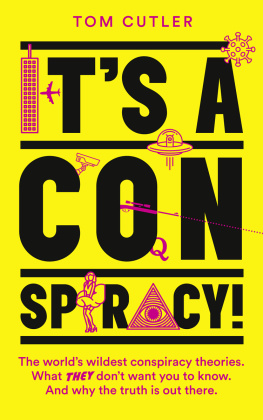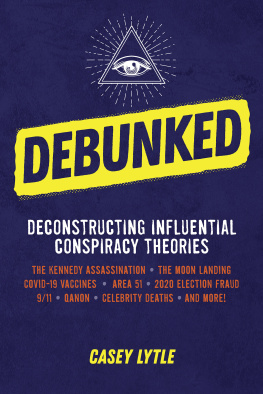First published 2018
by Routledge
2 Park Square, Milton Park, Abingdon, Oxon OX14 4RN
and by Routledge
711 Third Avenue, New York, NY 10017
Routledge is an imprint of the Taylor & Francis Group, an informa business
2018 Jan-Willem van Prooijen
The right of Jan-Willem van Prooijen to be identified as author of this work has been asserted by him in accordance with sections 77 and 78 of the Copyright, Designs and Patents Act 1988.
All rights reserved. No part of this book may be reprinted or reproduced or utilized in any form or by any electronic, mechanical, or other means, now known or hereafter invented, including photocopying and recording, or in any information storage or retrieval system, without permission in writing from the publishers.
Trademark notice: Product or corporate names may be trademarks or registered trademarks, and are used only for identification and explanation without intent to infringe.
British Library Cataloguing-in-Publication Data
A catalogue record for this book is available from the British Library
Library of Congress Cataloging-in-Publication Data
Names: Prooijen, Jan-Willem van, 1975 author.
Title: Psychology of conspiracy theories / Jan-Willem van Prooijen.
Description: New York, NY : Routledge, 2018. | Includes
bibliographical references.
Identifiers: LCCN 2017040641 (print) | LCCN 2017052772 (ebook) |
ISBN 9781315525419 (Master e-book) | ISBN 9781138696099
(hardback) | ISBN 9781138696105 (pbk.) |
ISBN 9781315436012 (ebk)
Subjects: LCSH: Conspiracy theories.
Classification: LCC HV6275 (ebook) | LCC HV6275 .P756 2018 (print) |
DDC 001.9dc23
LC record available at https://lccn.loc.gov/2017040641
ISBN: 978-1-138-69609-9 (hbk)
ISBN: 978-1-138-69610-5 (pbk)
ISBN: 978-1-315-52541-9 (ebk)
Typeset in Joanna
by Apex CoVantage, LLC

Climate change is a hoax perpetrated by the Chinese. The pharmaceutical industry hides evidence that vaccines cause autism. And there is a major conspiracy to cover up the fact that Barack Obama was born in Kenya. These are conspiracy theories that were propagated during the 2016 presidential campaign of Donald Trump. Scientists, journalists, policy makers, and other critics portray these theories as nave, far-fetched, not supported by evidence, or simply ridiculous. But why then do so many people believe such conspiracy theories? The appeal of these conspiracy theories among voters was substantial enough for Trump to win the Electoral College and become the 45th US president. This suggests that conspiracy theories cannot be dismissed as harmless entertainment or as manifestations of mental illness. Conspiracy theories are common among regular citizens and determine real and impactful choices in life such as who to vote for, whether to get ones child vaccinated, whether to place effort into reducing ones carbon footprint, whether to use contraceptives, and whether to aggress against dissimilar outgroups. It is time for the social sciences to take the widespread societal phenomenon of conspiracy theories seriously.
Who believes conspiracy theories, and who disbelieves them? Under what circumstances are people particularly susceptible to conspiracy theories? What are the consequences of believing in conspiracy theories? And what can policy makers do to reduce belief in conspiracy theories? These important questions are the domain of psychology. The present book was designed to provide a short, accessible, and state-of-the-art overview of the psychology of conspiracy theories. The main thesis of this book is that contrary to views that explain conspiracy theories through pathology belief in conspiracy theories is widespread among many citizens because they are rooted in normal psychological processes. Conspiracy theories originate through the same cognitive processes that produce other types of belief (e.g., new age, spirituality), they reflect a desire to protect ones own group against a potentially hostile outgroup, and they are often grounded in strong ideologies. Conspiracy theories are a natural defensive reaction to feelings of uncertainty and fear, blaming dissimilar outgroups for the distressing circumstances that one has to deal with.
Although this is a short book, there are more people to thank than space allows. At Routledge I thank Ceri Griffiths for embarking with me on this project and Elizabeth Rankin for her help. I also thank Michael Strang, who brought the new Routledge Psychology of series to my attention and persuaded me to write this book.
I greatly appreciate the many collaborations I have with scholars and students around the world on the psychology of conspiracy theories, and many of the ideas described in this book originated through discussions or joint research with them. I would like to particularly mention Paul van Lange, Andr Krouwel, Karen Douglas, Nils Jostmann, Reinout de Vries, Mark van Vugt, Robbie Sutton, Roland Imhoff, Michele Acker, Eric van Dijk, Thomas Pollet, Clara de Inocencio, and Olivier Klein. I also thank the many scholars that I met (and currently collaborate with on the topic of conspiracy theories) through two COST Action networks that I am privileged to be part of: COST Action Social psychological dynamics of historical representations in the enlarged European Union and COST Action Comparative analysis of conspiracy theories.
In my personal life I would like to thank John Ensberg, who believes far more conspiracy theories than I do yet also is one of my best friends. Finally, I thank my wife, Claudia van Prooijen-van Remundt: Somehow she manages to increase my productivity by frequently distracting me. Thanks to her for creating some balance, and I am glad to find out every day that there really is more to life than science.
Jan-Willem van Prooijen
Amsterdam, 26 July 2017
The Psychology of Everything
The Psychology of Everything is a series of books which debunk the myths and pseudo-science surrounding some of lifes biggest questions.
The series explores the hidden psychological factors that drive us, from our sub-conscious desires and aversions, to the innate social instincts handed to us across the generations. Accessible, informative, and always intriguing, each book is written by an expert in the field, examining how research-based knowledge compares with popular wisdom, and illustrating the potential of psychology to enrich our understanding of humanity and modern life.
Applying a psychological lens to an array of topics and contemporary concerns from sex to addiction to conspiracy theories The Psychology of Everything will make you look at everything in a new way.
Titles in the series:
The Psychology of Grief
Richard Gross
The Psychology of Sex
Meg-John Barker
The Psychology of Dieting
Jane Ogden
The Psychology of Performance
Stewart T. Cotterill
The Psychology of Trust
Ken J. Rotenberg
The Psychology of Working Life
Toon Taris
The Psychology of Conspiracy Theories
Jan-Willem van Prooijen
The Psychology of Addiction
Jenny Svanberg
The Psychology of Fashion
Carolyn Mair
The Psychology of Gardening
Harriet Gross
The Psychology of Gender
Gary W. Wood
For further information about this series please visit
www.thepsychologyofeverything.co.uk
Contents


![Christopher R. Fee - Conspiracies and Conspiracy Theories in American History [2 Volumes]](/uploads/posts/book/429085/thumbs/christopher-r-fee-conspiracies-and-conspiracy.jpg)









